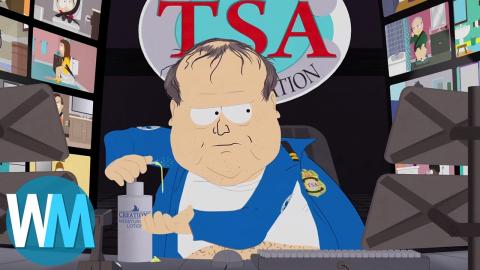Top 5 Facts about Airport Security

They do more than just make you throw out your shaving cream. Welcome to WatchMojo's Top 5 Facts.
In this instalment, we're counting down the Top 5 Facts about Airport Security. Given that the rules and regulations vary greatly depending on the country, we'll be focusing our attention on American airport security, also known as the “Transportation Security Administration” or “TSA” for short.
Special thanks to our users CoreyMcc11 and M.D.W. for submitting the idea on our interactive suggestion tool: WatchMojo.comsuggest
They do more than just make you throw out your shaving cream. Welcome to WatchMojo’s Top 5 Facts.
In this instalment, we’re counting down the Top 5 Facts about Airport Security. Given that the rules and regulations vary greatly depending on the country, we’ll be focusing our attention on American airport security, also known as the “Transportation Security Administration” or “TSA” for short.
#5: The TSA is Pretty New
Airport security has been around for decades, but the TSA specifically was only created following the 2001 September 11th attacks. Before that, private security companies used to handle airport security, but, for obvious reasons, this system was re-evaluated in the wake of such a catastrophic event. Originally created as a branch of the Department of Transportation, by 2003 the TSA had been transferred to the Department of Homeland Security. The working principle of the TSA, from its inception, has been to protect US transportation - with an emphasis on preventing airplane hijackings.
#4: Learn the 3-1-1 Rule for an Easy Time at Security
We all know that there are limitation as to what you can now pack in your carry on luggage, but with the stress of prepping for a trip, it can be easy to forget exactly what is allowed… and what’ll get thrown out. The TSA wants to help you remember with their “311” rule. Three point four ounces is the maximum size your toiletry products can be. They have to be put into a one quart sized clear bag (ie. a freezer sized Ziplock) and you’re only allowed to have one of these bags per traveller. If you follow these rules, you won’t have to worry about being forced to leave your favorite products behind!
#3: TSA Agents Are Held to a High Standard
Though the preliminary job requirements are relatively basic, being a TSA agent comes with a lot of responsibility. It’s about constant vigilance and frequent evaluation. Once you’re hired with the TSA, you’ll have to make it through one hundred hours of on the job training, consisting of forty classroom hours and sixty hours of on-site employee shadowing. The agents are then tested on a frequent basis to be sure that they’re alert, attentive, and, most importantly, aware of the latest rules and regulations. Since technology is constantly changing, TSA employees have to be trained to detect all manner of threats.
#2: Prohibited Items Don’t Necessarily Need to be Abandoned
The list of items banned from carry on luggage by the TSA is extensive. It ranges from the logical (like knives and firearms) to the more obscure (like vehicle airbags and foam toy swords). The things caught most often though, are personal items that exceed the 3.4 ounce maximum volume designated by the TSA. Most people think they they have to give up these items but in fact, it’s entirely your choice what you do with them. If permitted, the item can be put in your checked luggage or be returned to your car. The only issue is that you may not have time to make the trek if your flight is departing imminently.
#1: The TSA is Serious About Their Lost and Found
Considering the regulations that force airline passengers to empty their pockets, remove all electronics from bags and take off their shoes and belts, it’s inevitable that things can get lost in the fray. Considering approximately two million people pass through TSA checkpoints every day, the lost and found at each individual airport has to be well organized. The TSA prides themselves on being able to return items to passengers, and encourages flyers to contact them if they think they may have lost something while at a security checkpoint.
